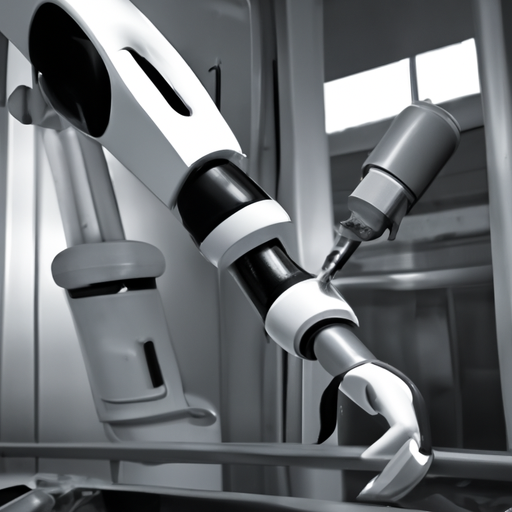In this article, we explore the fascinating topic of whether AI will replace human jobs and uncover which occupations are most vulnerable to this technological advancement. With AI rapidly advancing in capabilities, concerns have been raised about its potential to render certain professions obsolete. From customer service and transportation to manufacturing and even healthcare, no industry is immune to the potential impacts of AI. Join us as we delve into the potential implications and possibilities of AI in the workforce, and gain insight into which jobs may be at the greatest risk.
The Impact of AI on Jobs
Artificial intelligence (AI) has been a topic of immense interest and debate in recent years, especially when it comes to its impact on jobs. As the capabilities of AI continue to evolve and expand, there is a growing concern about the potential displacement of human workers by automated systems. At the same time, there are also significant benefits that AI brings to the job market, creating new opportunities and transforming industries. In this article, we will explore the potential impact of AI on jobs, identify which occupations are at higher risk, highlight opportunities that AI brings, discuss its role in specific industries, and provide insights on how to prepare for the AI revolution.
Jobs at Higher Risk
While AI has the potential to enhance productivity and efficiency in various industries, there are certain job roles that are at a higher risk of automation. These roles typically involve repetitive and manual tasks that can be easily programmed and performed by AI systems. For instance, jobs in manufacturing and assembly lines, where tasks are often routine and require limited decision-making, may face significant disruption due to advancements in AI technology.
Another area where job displacement is likely to occur is in data entry and administrative roles. As AI algorithms become more sophisticated in processing and analyzing data, the need for manual data entry and paperwork is diminishing. Similarly, customer service and support roles, especially in call centers, are also susceptible to automation as AI-powered chatbots and voice recognition systems continue to improve.
Furthermore, transportation and delivery services, such as truck driving and package delivery, are at high risk of automation with the emergence of autonomous vehicles and drones. These jobs heavily rely on repetitive tasks and adherence to set routes and protocols, which can be effectively carried out by AI systems.

Jobs at Lower Risk
While there are jobs that are more vulnerable to automation, there are also occupations that are less likely to be replaced by AI. These roles typically require a high level of creativity, innovation, emotional intelligence, and empathy, which are areas where AI is still struggling to match human capabilities.
Highly creative and innovative roles, such as artists, writers, and designers, rely on unique human creativity and the ability to think outside the box. The nuances, emotions, and aesthetics associated with these professions require a level of human touch that AI currently cannot replicate.
Similarly, jobs that require high emotional intelligence and empathy, such as therapists, counselors, and social workers, involve deep interpersonal connections and understanding of complex human emotions. These professions rely heavily on the ability to empathize and provide emotional support, which AI systems lack.
Skilled trades and craftsmanship are also less likely to be fully automated. Professions such as carpenters, electricians, and plumbers possess a blend of technical skills, problem-solving abilities, and hands-on expertise that is difficult to replicate with AI. These roles often require adaptability and flexibility in handling unique situations, making them less susceptible to full automation.
Finally, complex problem-solving occupations that involve a high level of critical thinking, strategic decision-making, and expertise in domains like law and medicine are less likely to be replaced by AI. While AI systems can assist in data analysis and information retrieval, the complex judgment and interpretation required in these fields often necessitate human intervention.
Possible AI Job Opportunities
While there is an apprehension about the potential loss of jobs due to AI, it is important to note that AI also brings numerous job opportunities. As the field of AI continues to grow and evolve, there is an increasing demand for skilled professionals who can develop, program, and maintain the AI systems.
AI developers and programmers are essential for creating and improving AI algorithms and systems. Their expertise lies in designing AI models, training data sets, and optimizing the performance of AI systems. These professionals bridge the gap between computer science and AI research, ensuring that AI technology is continually advancing.
Alongside developers and programmers, there is a need for AI trainers and explainers who can train AI systems and provide insights into their decision-making processes. These professionals play a crucial role in ensuring that AI models are ethically sound, unbiased, and aligned with human values.
Ethical AI consultants are becoming increasingly important in today’s world. With the growing concerns around AI bias, fairness, and transparency, these consultants help organizations navigate the ethical challenges associated with AI implementation. They ensure that AI systems adhere to regulations and guidelines, promoting ethical practices and mitigating potential negative impacts.
Another area where AI is creating job opportunities is in data science and analysis. With the enormous amount of data available, businesses need professionals who can collect, interpret, and derive meaningful insights from the data. Data scientists and analysts play a critical role in understanding consumer behavior, market trends, and business strategies by leveraging AI-powered algorithms.

The Role of AI in Specific Industries
AI has the potential to revolutionize various industries and transform the nature of work. Here we explore how AI is shaping specific sectors:
Healthcare and Medical Field
In the healthcare industry, AI is being utilized for clinical decision support, early disease detection, and patient monitoring. AI algorithms can analyze medical images, interpret diagnostic tests, and provide recommendations to healthcare professionals. While AI aids in improving accuracy and efficiency, it cannot replace the expertise and compassion of healthcare providers, particularly in complex decision-making situations and patient care.
Manufacturing and Production Sector
AI is revolutionizing the manufacturing sector by streamlining production processes, automating quality control, and enhancing supply chain management. Robots and AI systems can perform repetitive and physically demanding tasks with precision and speed, freeing up human workers for more complex and creative roles. Through AI-powered predictive maintenance, manufacturers can reduce downtime and optimize productivity.
Financial and Banking Domain
In the financial industry, AI is being leveraged for fraud detection, risk assessment, and personalized financial advice. AI algorithms can analyze vast amounts of financial data to detect patterns and anomalies, helping financial institutions identify potential fraudulent activities. AI-based chatbots are also being used to provide customer support and assist with financial inquiries, enhancing customer service and efficiency.
Legal and Paralegal Industry
AI is increasingly being used in the legal sector to assist with legal research, document review, and contract analysis. AI-powered software can review contracts, identify key clauses, and extract relevant information, saving significant time and effort for legal professionals. While AI tools can enhance efficiency and accuracy, the interpretation of law and legal strategy still require human intervention and expertise.
Preparing for the AI Revolution
To navigate the changing landscape of work with AI, individuals and organizations need to adapt and prepare effectively. Here are some key strategies:
Upskilling and Reskilling Programs
Investment in upskilling and reskilling programs is crucial to equip the workforce with the skills needed in an AI-driven world. Individuals should seek opportunities to learn new technologies, gain proficiency in data analytics, and develop critical thinking and problem-solving abilities. Companies can also play a vital role by providing training and development programs to help their employees transition into new roles that complement AI technologies.
Embracing AI-Human Collaboration
Rather than viewing AI as a threat, it is important to embrace AI-human collaboration. AI systems can augment human capabilities by automating repetitive tasks, enabling employees to focus on higher-value work that requires creativity, critical thinking, and emotional intelligence. By working alongside AI, humans can leverage their unique abilities and interact with AI systems to achieve optimal outcomes.
Policies and Regulations for AI Implementation
The ethical and responsible use of AI should be at the forefront of policy and regulatory discussions. Governments and organizations need to establish guidelines and regulations that ensure fair and unbiased AI systems. Considerations should be given to issues such as privacy, transparency, accountability, and the impact of AI on vulnerable populations. Collaboration between policymakers, industry experts, and AI developers is essential to strike the right balance.
Safeguarding Employment Rights and Benefits
As AI continues to automate certain job tasks, it is crucial to safeguard employment rights and benefits for workers. Policies and regulations need to address issues such as job displacement, retraining opportunities, and social safety nets. This can involve measures such as income support during transition periods, job placement services, and promoting job security in industries that are heavily affected by AI.

Overcoming the Challenges
While AI holds immense potential, there are a number of challenges that need to be addressed to ensure the responsible and equitable integration of AI systems:
Addressing Biases and Fairness in AI Algorithms
AI algorithms are only as unbiased as the data on which they are trained. It is important to address biases in training data to avoid perpetuating societal inequalities. Efforts should be made to diversify training data and ensure that AI models are fair and inclusive across different demographics, cultures, and communities.
Promoting Diversity and Inclusivity in AI Development
The development of AI systems should involve diverse teams that represent different backgrounds, perspectives, and experiences. This helps prevent the development of biased AI systems and promotes inclusivity. Organizations and institutions should actively encourage diversity in AI research and development to ensure AI systems are representative and serve the needs of all.
Ensuring Transparency and Accountability in AI Systems
AI systems should be transparent in their decision-making processes. Users should be able to understand how and why an AI system made a particular decision. This transparency helps build trust, enables fair decision-making, and allows individuals to challenge and correct potential biases. Organizations should prioritize explainability and publish clear guidelines on how their AI systems operate.
Balancing Economic Growth with Social Welfare
While AI has the potential to drive economic growth, it is crucial to ensure that the benefits are shared equitably. Income inequality and job displacement can have significant social consequences. Governments, organizations, and businesses need to take proactive steps to minimize these negative impacts by implementing policies that support retraining and providing alternative employment opportunities.
The Future Workforce with AI
As the AI revolution continues to unfold, the workforce will undergo significant transformations. Here are some ways the future workforce will evolve:
Redefining Job Roles and Job Descriptions
As certain job tasks become automated, there will be a need for workers to redefine their roles and expand their skillsets. Jobs are likely to evolve, with AI taking over routine and repetitive tasks, while humans focus on creative and strategic aspects of their work. This demands a continuous learning mindset and adaptability to new technologies and evolving job requirements.
Enhanced Productivity and Job Satisfaction
AI has the potential to enhance productivity by eliminating mundane and repetitive tasks, allowing humans to focus on more stimulating and fulfilling work. With AI taking over routine tasks, employees can devote their time and energy to areas that require uniquely human skills, such as critical thinking, problem-solving, and innovation. This shift can contribute to higher job satisfaction and fulfillment.
Shifting Focus towards Creative and Social Skills
As AI becomes increasingly prevalent, human workers will need to develop and emphasize skills that AI cannot easily replicate. These include creativity, emotional intelligence, empathy, and social skills. Jobs that require the uniquely human traits of creativity and emotional connection will be in higher demand and provide job security in the AI era.
Embracing Lifelong Learning and Adaptability
In a rapidly evolving job market, lifelong learning and adaptability will be key to remaining competitive. Individuals will need to continuously update their skills to keep pace with AI advancements. This can involve pursuing certifications, attending training programs, enrolling in online courses, or participating in professional development opportunities. Cultivating a growth mindset and a willingness to embrace change will be essential.

Ethical Considerations
As AI becomes more pervasive, it is crucial to consider the ethical implications that arise in its context:
Ethical Implications of AI in Job Displacement
The potential displacement of human workers by AI systems poses significant ethical challenges. It raises concerns about job security, income inequality, and the impact on communities and individuals who rely on these jobs for their livelihood. It is essential to ensure that the benefits of AI are equitably distributed and that measures are in place to support those affected by job displacement.
Ensuring AI Aligns with Societal Values
AI systems are only as ethical as the principles and values embedded within them. It is vital to align AI development with societal values and ensure that AI systems respect fundamental rights and norms. Transparency, accountability, and fairness should be at the core of AI design and implementation to build trust and ensure the well-being of individuals and communities.
Mitigating Negative Impacts on Marginalized Communities
AI has the potential to exacerbate existing societal inequities and biases if not carefully implemented. It is crucial to consider the diverse needs and experiences of marginalized communities during AI development. Adequate representation, data inclusivity, and impact assessments should be undertaken to minimize discriminatory practices and biases.
Maintaining Human Control over AI Systems
Despite the advancements in AI technology, the ultimate responsibility and control should remain in human hands. Human oversight is essential to ensure that AI systems operate ethically and responsibly. While AI can provide valuable insights and support decision-making, important ethical judgments and critical decisions should be made by humans.
Conclusion
As AI continues to advance and reshape various industries, it is crucial to find a balance between harnessing the benefits it brings while minimizing potential risks. AI has the potential to automate certain jobs, but it also presents new opportunities and enhances productivity. While some job roles may be at risk, others that require uniquely human skills are likely to remain secure. By proactively upskilling and reskilling, embracing AI-human collaboration, establishing ethical guidelines, and safeguarding employment rights, we can adapt to the AI revolution and create a future workforce that thrives. By addressing ethical considerations, promoting transparency, and actively working towards inclusivity, we can ensure that AI aligns with societal values and promotes the well-being of all. The future work landscape may change, but with thoughtful planning and adaptation, we can anticipate and embrace the changes that AI brings.













